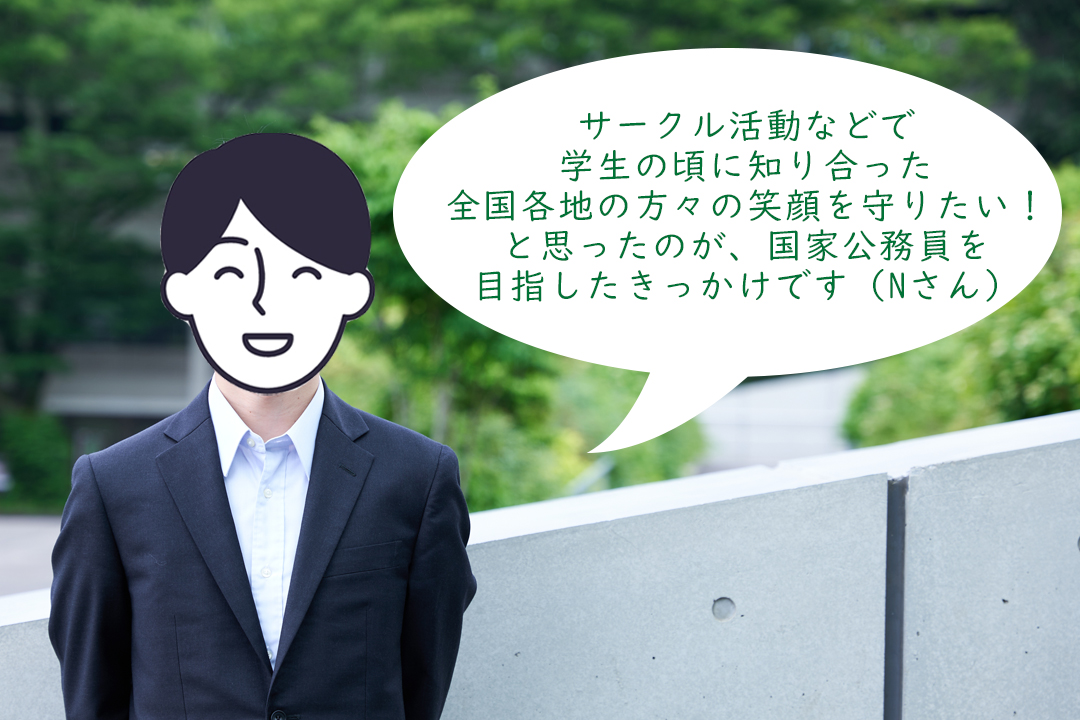
While there is a positive image of the work of civil servants as "stable," people tend to have preconceptions about their work, such as "doesn't it involve a lot of overtime?" "It's all about simple tasks and tasks" "It seems inflexible." How do people who actually work as civil servants feel about their work and the work environment? This time, we held an undercover roundtable discussion in which three senior members of the workforce, in their third to sixth years of employment, who work as local public servants, national civil servants in general positions, and national civil servants in special positions, shared their true feelings. A must-see is the charm of civil servants, behind the scenes, and advice for job hunters as told by seniors!
INDEX
▼There is also a sense of fulfillment that comes from not seeking profit. What is the appeal of working as a civil servant?
▼When did you feel the difference from private companies? Real voices from senior civil servants
▼This kind of person is suitable for the civil service!? Message to job hunters aiming to become civil servants
▼Introducing courses for civil servant applicants held at Career Center
Our young staff members will speak openly in a masked roundtable discussion!
・ A Local civil servant Graduated from School of Advanced Science and Engineering
・ N Graduated School of Political Science and Economics for general public servant positions
・ I Graduated School of Advanced Science and Engineering special position as a national civil servant.
There is also a sense of fulfillment that comes from not seeking profit. What is the appeal of working as a civil servant?
First of all, please tell us about your current job.
A: I am in my 6th year as a technician at City Hall, and I am currently in a department that provides technical support to small and medium-sized enterprises. Specifically, we receive requests to investigate the cause of product defects and check products for quality control, conduct product analysis and research, and make suggestions for improvement.
N: I work in a department related to regional development. It's been two years since I joined the ministry, and my current job is mainly to receive requests for the creation of various materials related to local governments, compile them, and distribute them within the department and other ministries. In order to create materials, it is necessary to study and understand a wide range of fields, such as the development of remote islands, the development of public facilities through public-private partnerships, and the promotion of other individual projects.
I: I am currently in the training period (*1) to become a court clerk. I worked as a clerk for about three years until I passed the training course exam last year. Clerks primarily support the judges and clerks, such as answering the telephone and counters, and preparing for court dates.
(*1) If the faculty you graduated from is School of Law, you will need a one-year training period, and in other cases, you will need a two-year training period.

"When I was a student, I worked part-time as a cram school instructor. From that experience, I wanted to do work that touched people's lives, which was one of the reasons I wanted to work in the courthouse." (I)
Are there any gaps you felt when you started working?
I: I didn't have anything in particular. It 's a very easy-to-work environment, and I got the impression that it must be a good place to work while listening to my seniors talk about it while job hunting.
N: I didn't find any big gaps either, but I felt that I had more opportunities to interact directly with local governments than I expected. I had a strong impression that ministries and agencies were people who thought about systems, but it was a nice gap to be able to gain a thorough knowledge of the field.

A: It may depend on the department, but when I actually worked there, there was less routine work than I had imagined, which changed my impression of local civil servants. New measures that match the times are coming out all the time, and I can get involved in projects that are solicited throughout the agency, so I think I can work flexibly without getting bored.
What do you think is the appeal of working as a civil servant?
N: There are advantages to not being obsessed with profits.
A: Come to think of it, the fact that we are able to deal with companies from a different perspective than achieving sales targets or quotas may be a different point from private companies. In my current job, I find it rewarding to be able to put the other company's interests first, rather than my own profits, and to propose good analytical methods at the lowest possible cost.
N: Regarding the regional revitalization that we are currently working on, based on the idea of preserving diverse regions, we do not focus on profitability, but rather on a multifaceted and fair perspective. It is possible to take a look at this and come up with measures.
I: Also, this is just my impression, but in a private company, I get the impression that employees are competing with each other. On the other hand, in courts that are not for profit, I feel that there is a strong culture of mutual support among colleagues rather than rivalry. Personally, I really like the atmosphere where when a problem arises, someone comes to the office immediately and we work together to solve it.
When did you feel the difference between you and a private company? Real voices from senior civil servants
As mentioned earlier, are there any other situations where you feel the difference between public servants and private companies?
A: There are many times when I'm begging for things that I don't have and think, ``It's nice to go to the private sector.'' (laughs) For example, civil servants have to go through a lot of procedures to purchase even a single office item, and are strict about how they spend their money, making it difficult to move around.

"I would never be able to pay in advance!" (Mr. A)
I: Same goes for me! The standards for making a claim for goods are very strict, and the teacher in charge of mediation once pointed out to me, ``There are no wet wipes in the courthouse.'' Even if there are parts of the building that are showing signs of aging, it may remain that way for a long time.
N: Renovations also cost money, so you have to be careful. When a friend of mine who started working in the private sector posts photos of the friend's stylish office on social media, I am surprised and feel ``It's so clean!'' I feel like this also reflects the idea that I felt while working as a civil servant: ``There's no need to force changes because things have always worked.''
What about salary and welfare benefits?
N: Just because you're a civil servant doesn't mean your benefits are particularly good. The upper limit for rent allowance is 20,000 to 30,000 yen.
A: Well, ours is even lower (lol). Sometimes I think the salary would be better in the private sector (*2).
I: But I think it's easy to take vacations. I hear that some companies make it difficult for young employees to take paid leave, but I make sure to use it to the fullest (lol). Furthermore, in the court I am currently in, there is at least one person in the department taking maternity or childcare leave, and there is a tendency for this to be accepted as a matter of course.

A: Certainly! In my department, there are many senior employees who return to work after childcare leave and serve as role models. It's a work environment that makes it easy to maintain a balance between personal life and work, even when life stages change, such as childbirth, childcare, and nursing care. Is it the same for ministries?
N: That's right. You will need to make adjustments to your work schedule, but I think it is also easy to take time off at ministries and agencies.
(*2) The salaries of national civil servants are determined based on the recommendations of the National Personnel Authority, which investigates and compares the actual state of salaries between national civil servants and those in the private sector. Local public servants' salaries are often adjusted by local governments based on private sector salaries.
Is there anything about the job of a civil servant that you particularly wish would change?
A: When I work, I find that I tend to maintain the status quo. I find it difficult to stop or improve something that already exists.
N: I agree!
A: In order to change something that already exists, it is necessary to explain the reason convincingly to many people and obtain their consent. I would like to change the tendency of choosing to maintain the status quo out of fear.
N: On the other hand, I would like to see more changes in the way we work. Yesterday, I took the last train home, but even when I left work at 11:45 p.m., my classmates and seniors were still online.

"Politicians have a strong influence. Sometimes I get requests suddenly, so I get very busy that week..." (N)
I & A: Really?!
N: I want to convey the truth without hiding it (lol). It may be my lack of ability, but there are many young people who want us to improve this demanding environment. If it becomes difficult to balance work and family life, such as starting a family, there may be a possibility of changing jobs. What do you think you would like to change?
I: I'm concerned about the strong analog aspect. I was especially surprised that the register used for attendance management was a paper entry system. However, things are starting to change gradually, and we are working hard to introduce chat tools into our work and advance the use of IT in civil court procedures.
Is this kind of person suitable for the civil service? Message to job hunters aiming to become civil servants
What kind of person do you think is suitable for being a civil servant?
I: I have had many opportunities to talk with people who have complex situations. In that sense, I felt it was important to be able to treat the people with compassion. I think it would be a good fit for someone who can think from the other person's perspective, not just a court clerk.
N: When you think about it, civil servants are generally required to have good communication skills. For example, when an unexpected task arises, rather than resolving it with money, I respectfully request the relevant parties on a ``request basis.'' In such situations, I truly realize the importance of communication. Also, people who have a wide range of antennae and can enjoy anything may also be suitable. I would be happy if someone who is willing to take on new challenges could join us, as we may be affected by social conditions or have to do work that is outside of our area of expertise.
 A: Certainly. Civil servants are often transferred and have a wide variety of duties, so it's good to be able to approach everything with the spirit of trying it out.
A: Certainly. Civil servants are often transferred and have a wide variety of duties, so it's good to be able to approach everything with the spirit of trying it out.
Lastly, please give some advice to job hunters aiming to become civil servants!
A: For the civil service exam, I think it is important not only to prepare for the written test but also to prepare for the interview. Especially when interviewing for a local government that is not your local area, you will almost always be asked, "Why did you choose this place?" As a countermeasure, I tried to develop motivations for applying that were related to the policies of the local government. If you are aiming to become a local government official, I think it would be a good idea to thoroughly research your local government's initiatives on its website or in the pamphlets available at government offices.
I: I started taking a civil service exam preparation course at Career Center around May of my third year at university, and started attending a vocational preparatory school in the fall. Considering the amount of information on study methods and visits to government offices, I think it would be a good idea to consider a specialized preparatory school. Moreover, the courtroom is a workplace where you can improve your professionalism regardless of the department you graduated from, as there is an environment in which seniors around you will kindly teach you. I am really glad that I worked at the courthouse, and I would like to fully recommend it to everyone!
N: My first choice was to work at my current ministry, and I hardly looked at private companies when job hunting, but there are times when I think, ``I should have put a little more effort into job hunting in the private sector.'' This is because, although the job of a civil servant is to interact deeply with a variety of people, including private companies, NPOs, and local residents, I did little research on companies when I was job hunting, and I realized that I didn't really understand the circumstances of each company. It was. Therefore, an attitude of understanding that the region or country as a whole is made up of many factors will surely be useful once you become a civil servant.

Interview and text: Akane Ichikawa (Graduated from School of Culture, Media and Society in 2017)
Photography: Nanako Ono
Introducing courses for civil servant applicants held at Career Center
Career Center holds courses for students aiming to become civil servants. We also provide a variety of other services, such as setting up a LINE open chat where students aspiring to become civil servants can exchange information, and publishing past questions from civil service exams. Click here for details.

[Next Focus Preview] “Atom Currency Special” to be released on Monday, June 19th






![[Save version] Map of the four main campuses](https://www.waseda.jp/inst/weekly/assets/uploads/2025/09/17cb2975123fc5103172ef60bd98608d-610x458.jpg)

